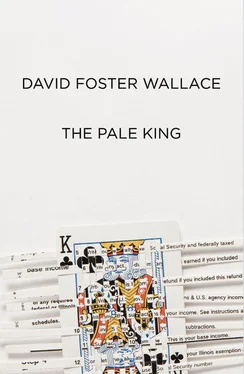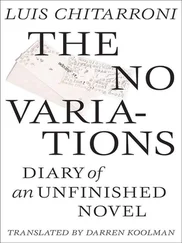‘Too much, you say?’ he said. ‘Cowboy, paladin, hero? Gentlemen, read your history. Yesterday’s hero pushed back at bounds and frontiers — he penetrated, tamed, hewed, shaped, made, brought things into being. Yesterday’s society’s heroes generated facts. For this is what society is — an agglomeration of facts.’ (Obviously, the more real Advanced Tax students who gingerly got up and left, the more my feelings of being particularly, uniquely addressed increased. The older business student with two lush, perfectly trimmed sideburns and incredible notes beside me was able to close his briefcase’s metal clasps without any sound at all. On the wire rack beneath his desk was a Wall Street Journal that he’d either not read or had perhaps been able to read and refold so perfectly it looked untouched.) ‘But it is now today’s era, the modern era,’ the substitute was saying (which was difficult to argue with, obviously). ‘In today’s world, boundaries are fixed, and most significant facts have been generated. Gentlemen, the heroic frontier now lies in the ordering and deployment of those facts. Classification, organization, presentation. To put it another way, the pie has been made — the contest is now in the slicing. Gentlemen, you aspire to hold the knife. Wield it. To admeasure. To shape each given slice, the knife’s angle and depth of cut.’ However transfixed I still was, I was also aware, by this point, that the substitute’s metaphors seemed to be getting a bit jumbled — it was hard to imagine the remaining orientals making much sense of cowboys and pies, since they were such specifically American images. He went to the flag-stand in the corner of the room and retrieved his hat, a dark-gray business fedora, old but very well cared for. Instead of putting the hat on, he held it up aloft.
‘A baker wears a hat,’ he said, ‘but it is not our hat. Gentlemen, prepare to wear the hat. You have wondered, perhaps, why all real accountants wear hats? They are today’s cowboys. As will you be. Riding the American range. Riding herd on the unending torrent of financial data. The eddies, cataracts, arranged variations, fractious minutiae. You order the data, shepherd it, direct its flow, lead it where it’s needed, in the codified form in which it’s apposite. You deal in facts, gentlemen, for which there has been a market since man first crept from the primeval slurry. It is you — tell them that. Who ride, man the walls, define the pie, serve.’ There was no way not to notice how different he looked now from the way he’d appeared at the beginning. Ultimately, it wasn’t clear whether he’d planned or prepared his final hortation or exhortation or not, or whether he was just speaking passionately from the heart. His hat was noticeably more stylish and European-looking than my father’s had been, its welt sharper and band’s feather pegged — it had to be at least twenty years old. When he raised his arms in conclusion, one hand still held the hat—
‘Gentlemen, you are called to account.’
One or two of the remaining students clapped, a somehow terrible sound when it’s only a few scattered hands — like a spanking or series of ill-tempered slaps. I remember having a visual flash of something lying in its crib and waving its limbs uselessly in the air, its mouth open and wet. And then of walking back across the transom and down and out of Daniel and over to the library in a strange kind of hyperaware daze, both disoriented and very clear, and then the memory of that incident essentially ends.
After that, the first thing I can remember doing over the holiday recess in Libertyville was getting a haircut. I also then went to Carson Pirie Scott’s in Mundelein and bought a dark-gray ventless wool suit with a tight vertical weave and double-pleat trousers, as well as a bulky box-plaid jacket with wide notched lapels, which I ended up almost never wearing, as it had a tendency to roll at the third button and produce what almost looked like a peplum when it was buttoned all the way. I also bought a pair of Nunn Bush leather wing tips and three dress shirts — two white oxfords and one light-blue sea island weave. All three collars were of the button-down type.
Except for practically dragging my mother to Wrigleyville for Christmas dinner at Joyce’s, I spent nearly the whole holidays in the house, researching options and requirements. I remember I was also deliberately trying to do some sustained, concentrated thinking. My inner feelings about school and graduating had totally changed. I now felt suddenly and totally behind. It was a bit like the feeling of suddenly looking at your watch and realizing you’re late for an appointment, but on a much larger scale. I had only one term left now before I was supposed to graduate, and I was exactly nine required courses short of a major in accounting, to say nothing of trying to sit for the CPA exam. I bought a Barron’s guide to the CPA exam at a Waldenbooks in the Galaxy Mall off of Milwaukee Road. It was given three times a year, and it lasted two days, and you were strongly advised to have had both intro and intermediate financial accounting, managerial accounting, two semesters of auditing, business statistics — which, at DePaul, was another famously brutal class — intro data processing, one or preferably two semesters of tax, plus either fiduciary accounting or accounting for nonprofits, and one or more semesters of economics. A fine-print insert also recommended proficiency in at least one ‘high-level’ computer language like COBOL. The only computer class I’d ever finished was Intro Computer World at UI–Chicago, where we’d mostly played homemade Pong and helped the prof try to recollate 51,000 Hollerith punch cards he’d stored data for a project on and then accidentally dropped on a slick stairway. And so on and so forth. Plus, I looked at a business-stats textbook and discovered that you needed calculus, and I hadn’t even had trigonometry — in my senior year of high school, I’d taken Perspectives on Modern Theater instead of trig, which I well remembered my father squeezing my shoes about. Actually, my hatred of Algebra II and refusal to take any more math after that was the occasion for one of the really major arguments that I heard my parents have in the years before they separated, which is all kind of a long story, but I remember overhearing my father saying that there were only two kinds of people in the world — namely, people who actually understood the technical realities of how the real world worked (via, his obvious point was, math and science), and people who didn’t — and overhearing my mother being very upset and depressed at what she saw as my father’s rigidity and small-mindedness, and her responding that the two basic human types were actually the people so rigid and intolerant that they believed there were only two basic human types, on one side, versus people who believed that there were all different types and varieties of people with their own unique gifts and destinies and paths through life that they had to find, on the other, and so forth. Anyone eavesdropping on the argument, which had started as a typical exchange but escalated into an especially heated one, could quickly tell that the real conflict was between what my mother saw as two extremely different, incompatible ways of seeing the world and treating the people you were supposed to love and support. For instance, it was during this argument that I overheard my father say the thing about my being unable to find my ass even if it had a large bell attached to it, which my mother heard mainly as him passing cold, rigid judgment on somebody he was supposed to love and support, but which, in retrospect, I think might have been the only way my father could find to say that he was worried about me, that I had no initiative or direction, and that he didn’t know what to do as a father. As is well-known, parents can have vastly different ways of expressing love and concern. Of course, much of my interpretation is just speculative — there’s obviously no way to know what he really meant.
Читать дальше












